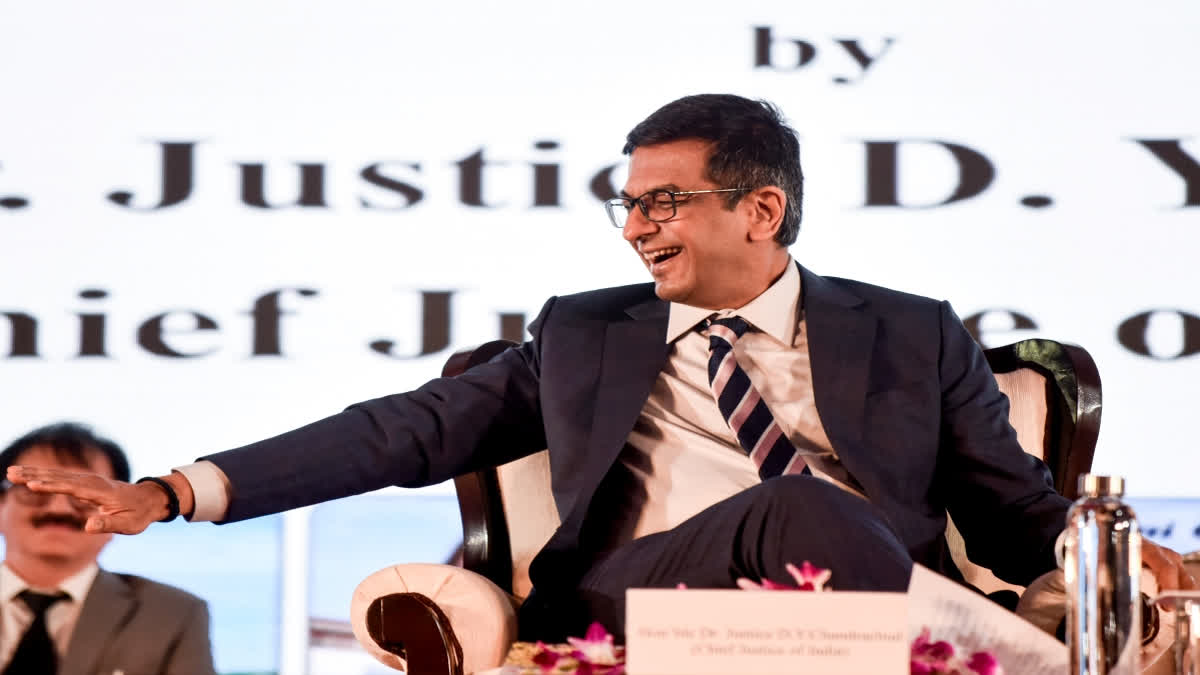Mumbai (Maharashtra): The Chief Justice of India D Y Chandrachud on Thursday said regulators like SEBI and appellate forums like the Securities Appellate Tribunal (SAT) assume immense national importance in fostering a stable and predictable investment environment.
The CJI, while inaugurating the new office premises of the SAT at Mittal Court, Mumbai, said when we think of the idea of 'rule of law', we often associate it with only social and political justice.
However, as early as 2005, the World Bank theorised that protecting the 'rule of law' is also intrinsically linked to better economic outcomes and financial advancement.
"A legal system that has adequate procedural safeguards, fairness, and forums that dispense justice without arbitrariness, is integral to building investor confidence in a country's markets and business landscape," he said.
The CJI stressed that regulators like SEBI and appellate forums like the SAT assume immense national importance in fostering a stable and predictable investment environment.
"When investors feel assured that their investments are protected by law and that there are effective mechanisms for dispute resolution, they are more likely to invest in the country’s markets. This influx of investment can lead to better economic outcomes, such as increased capital formation, job creation, and overall economic growth”, he said.
The CJI said that the SAT is like a referee, ensuring that in the 'dog-eat-dog' world of finance, all stakeholders play by the rules and just like any good referee, the SAT has successfully kept pace with the evolving game. “As our markets and businesses become more complex and new regulations flood in, the tribunal must consistently rise to the challenge”, he said.
The CJI emphasised that to effectively adjudicate the appeals before the tribunal, members require not only a deep understanding of intricate financial matters but most importantly, a strong commitment to fair adjudication and procedural safeguards. "This is crucial in maintaining market integrity, and investor confidence," he added.
The CJI said the rapid growth in the number of market participants, and the increase in the volume of financial transactions, brings with it the likelihood of an increased number of disputes pertaining to regulatory non-compliance, market conduct, corporate governance, and shareholders.
Citing the manifold increase in appeals filed before the SAT, the CJI said in such a scenario, the vacancies in the SAT must be filled at the earliest to allow the tribunal to work effectively and at full capacity.
"In fact, the SEBI Act also allows for the setting up of benches of the SAT. It may be worth giving greater thought to the proposals of equipping the tribunal with additional benches and improved infrastructure to manage its escalating caseload”, he said.
The CJI said: “They say that in the financial world, there are three types of people: those who make things happen, those who watch things happen, and those who wonder what just happened. I am hopeful and certain the Securities Appellate Tribunal will continue to fall in the first category".
The CJI said when we speak of modernising infrastructure, we must not limit our discussion to physical infrastructure and digital infrastructure assumes equal importance and the concept of 'access to justice' needs to be reimagined.
"In Sarvesh Mathur v. The Registrar General, High Court of Punjab and Haryana, the Supreme Court issued several directions to ensure the continued use of video conferencing facilities across High Courts and Tribunals. It is commendable that the SAT has been at the forefront in adopting technology including virtual hearings and e-filing, both during the COVID-19 pandemic and after it subsided," he said.
Justice DK Upadhyaya, Chief Justice of the High Court of Bombay, retd. Justice PS Dinesh Kumar, Presiding Officer of the Securities Appellate Tribunal (SAT), Dheeraj Bhatnagar and Meera Swarup, technical members of the SAT, registrar, and members of the administrative staff were also present at the function.



